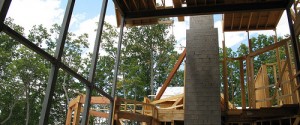In the past year or so, demand outpaced supply in the Northern Virginia real estate market. Many home builders and tradesmen went out of business in 2008-2009, creating a shortage of home builders. For home buyers, a custom home offers the prospect of owning a made-to-order dream home. For the builder, the custom home business brings rewards as well. These include the pricing of a premium product and working closely with buyers to help them fulfill their dreams. These dreams bear the legal complexity of contracting for the sale of something that does not yet exist. For the buyer, this is the biggest consumer purchase of their life. They rightly take pride of ownership in the project. This blog post identifies a few key issues from the perspective of the custom builder for the New Year:
- Liability Shield. You stand behind your work and want to keep your customers happy. This is how business grows. At the same time, you owe it to yourself and your family to protect your personal assets and credit. Customers expect that they will be doing business with a company. By incorporating or forming an LLC prior to making contracts, custom builders can exercise reasonable control of the exposure of their own credit and assets. Communications and agreements with customers should clarify the seller’s identity.
- Choosing the Customer. Prospective customers are likely talking to other builders or realtors. If a prospect reminds you too much of a previous problem customer, she may not be a good fit for your business. The wrong customer may distract you away from your more deserving customers and prospects. Consult with legal counsel if anti-discrimination or fair credit laws may apply.
- Written Agreements. Use an attorney-prepared written contract prepared for the particular type of project and state law. It may not be necessary to have a “new” form for each job. However, a realtor form for the sale of homes in Maryland won’t work well for a custom home in Virginia.
- Customer Service. Always have someone available to handle customer inquiries, at least during normal business hours. Buyers of custom homes tend to visit the site frequently and have questions. They feel a tremendous amount of financial and emotional investment in the project.
- Project Control. Don’t allow the consumer to directly supervise your subcontractors on the job site. An excited buyer may want to go outside his contract with you and hire his own tradesman to install items on property they don’t yet own. No car dealer would allow a shopper to take an auto to a body shop for a custom paint job during an extended test drive. The custom home builders do themselves and the customer a favor by anointing a manager or site supervisor to “face” with the client.
- Happy Endings. Take walk through inspections, punch lists and closings as an opportunity to communicate with the buyer and wrap things up effectively.
Home builders unfairly have a reputation for being unresponsive or inflexible with their customers. More often, custom builders struggle with being too accommodating with the demands of buyers. Most of all, custom home buyers expect the builder to provide them with personal leadership and advice. Attention to the legal aspects of your customer relationships is a critical element of entrepreneurial creativity and leadership.
- Words of Conveyance Blog is Moving! - September 30, 2021
- Condominium Bylaw Liability Waivers and Claims for Water Damage - August 12, 2021
- Can Zoning Enforcement Officials be Sued for Malicious Prosecution? - August 6, 2021
